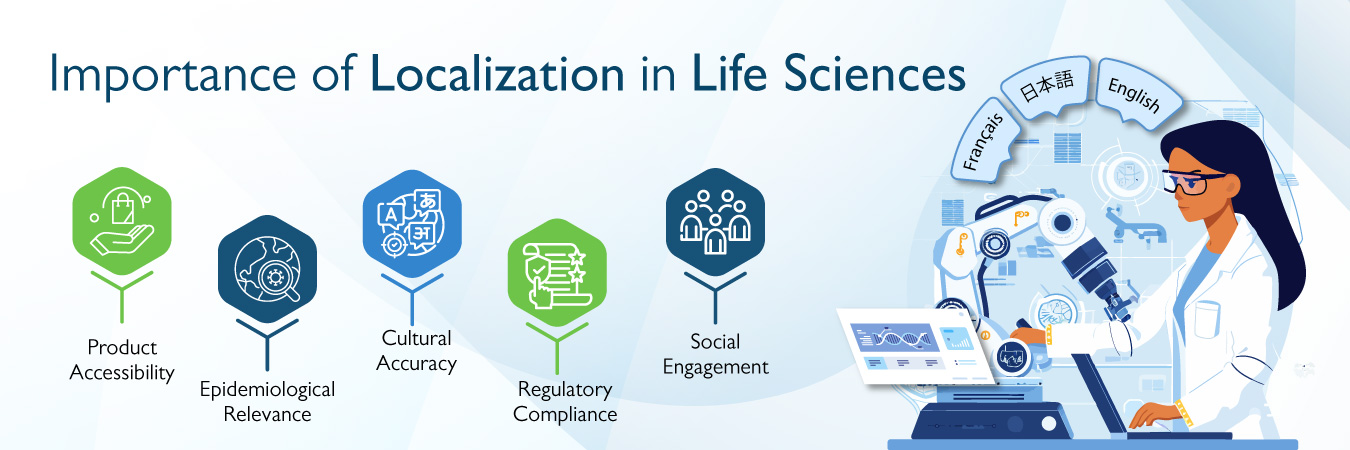
Importance of Localization in Life Science
Life sciences offerings and products cannot stay confined to a particular region. With everything that they can potentially do, they should reach every corner of the world and benefit as many people as possible.
However, expanding a life sciences business geographically is as challenging as others. To make life sciences discoveries more comprehensible, the researchers have to ensure that they reach the beneficiaries in their language. That’s where localization in life science comes into the picture!
If you are a life sciences company looking for territorial expansion and venturing into new markets, here’s why you should invest in localization.
6 Benefits of Localization in Life Science
The importance of localization in life science can be seen through different perspectives. Six of them include the following.
1. Product Accessibility
Localizing life science offerings and communication makes them more accessible to diverse communities with variations in their linguistic, socioeconomic backgrounds and prevailing healthcare ecosystems. Localizing essentially refers to personalizing the invention and related communication to match the local needs. While helping enhance the messaging, it can break the conventional shackles of accessibility and lead to better health outcomes across various sections of the world’s population, including those underprivileged.
2. Epidemiological Relevance
Although the human body has a uniform anatomy everywhere, disease patterns, risk factors, and health behaviors can vary across regions, races, and population groups. Localization in life science allows healthcare providers and researchers to comprehend local epidemiological trends and design strategies for disease prevention, diagnosis, and treatment. It can help them enhance results by designing more impactful and aligned innovations.
3. Cultural Accuracy
Localization involves dealing with different cultures, practices, and perspectives. Life sciences innovations and their localization are no exception. People from different regions of the world have varying beliefs, practices, and retrospect concerning illnesses, health, and the underlying treatment. To overcome these obstacles and to bring everyone on the same page of understanding, localization in life sciences involves ensuring healthcare interventions and research initiatives value local cultures. The purpose is to increase the acceptance of offerings and make them more effective in terms of results.
4. Environmental Adaptation
The world is an environmentally diverse place. Despite being under the same umbrella, countries and regions have varying climatic conditions. The annual temperature in Australia is different from that of Norway.
However, in the context of life sciences, these environmental factors have a significant impact on health outcomes and disease transmission.
Life sciences localization helps account for these variations while researching, and studying diseases and their impact on different population groups. Thus, it helps align the interventions and implement public health measures appropriately.
5. Regulatory Compliance
Another critical aspect of life science is regulatory compliance. The regulatory requirements concerning clinical trials, research, and healthcare practices differ from country to country. They are the result of years of studies and research conducted by different healthcare organizations. Localization plays a crucial role in ensuring compliance with local regulations and ethical standards. Thus, it facilitates the ethical conduct of scientific research and ensures delivering safe and effective healthcare services and innovations.
6. Social Engagement
Life sciences research involves extensive local community participation for better and more accurate outcomes. However, linguistic differences and incomprehensibility of the information or research objectives may stop local communities from participating. Such reluctance can impede research.
Here, localization can play a crucial role. Localizing the communication can help increase the understanding of the research objectives, foster active participation in the decision-making process, and increase the overall effectiveness of the research process and outcomes.
Take Your Life Sciences Initiatives to the World with Filose!
Do you have a life science initiative that can drive a potential breakthrough for the world? Then, Filose is here to help you on the localization front. Our localization solutions for the life sciences sector, technical understanding, and incomparable expertise in over 200 Indian and foreign languages can help you broaden your scope of research and outreach beyond your imagination. Email us at sales@filose.com to learn more about our localization services.
Ref. No – FLB04241052
Contact Us
Are you looking for Language Services? Fill form for quick contact.
